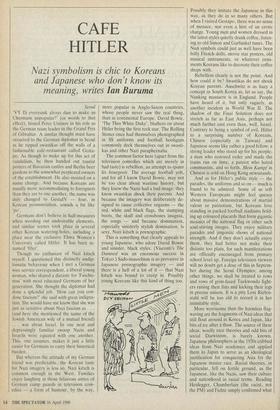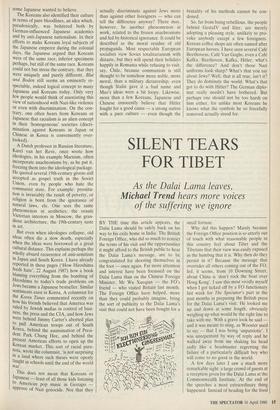CAFE HITLER
Nazi symbolism is chic to Koreans and Japanese who don't know its
meaning, writes Ian Buruma Seoul 'VY IS everysink alvays dun to make us Chermans unpopular?' (or words to that effect), hissed Peter Ustinov in his role as the German team leader in the Grand Prix of Gibraltar. A similar thought must have occurred to the German diplomat in Seoul as he ripped swastikas off the walls of a fashionable café-restaurant called Gesta- po. As though to make up for this act of vandalism, he then handed out tourist posters of Bavarian castles and Berlin beer gardens to the somewhat perplexed owners of the establishment. He also insisted on a name change. And because Koreans are usually more accommodating to foreigners than they are to one another, the name was duly changed to GestalV — four, in Korean pronunciation, sounds a bit like 'po'.
Germans don't believe in half-measures when weeding out undesirable elements, and similar scenes took place in several other Korean watering-holes, including a place near the exclusive Ehwa Women's University called Hitler. It has been re- named 'Itler'.
Though no enthusiast of Nazi kitsch myself, I questioned this distinctly undip- lomatic behaviour when I met a German wire service correspondent, a liberal young woman, who shared a distaste for 'Faschis- mus' with most educated Germans of her generation. She thought the diplomat had done a splendid job. 'How can you con- done fascism?' she said with great indigna- tion. She would have me know that she was just as sensitive about Nazi fascism as . . . (and here she mentioned the name of the Jewish American wife of a mutual friend) . . . was about Israel. In one neat and depressingly familiar swoop Nazis and Israelis were equated with one another. This, one assumes, makes it just a little easier for Germans to carry their historical burden.
But whereas the attitude of my German friend was predictable, the Korean taste for Nazi imagery is less so. Nazi kitsch is common enough in the West. Families enjoy laughing at those hilarious antics of German camp guards in television com- edies — a form of humour, by the way, more popular in Anglo-Saxon countries, whose people never saw the real thing, than in continental Europe. David Bowie, The Thin White Duke', blathers on about Hitler being the first rock star. The Rolling Stones once had themselves photographed in SS uniforms and football hooligans commonly deck themselves out in swasti- kas and other Nazi paraphernalia.
The common factor here (apart from the television comedies which are merely in bad taste) is rebellion, an attempt to epater les bourgeois. The average football yob, and for all I know David Bowie, may not be too clear about wartime history, but they know the Nazis had a bad image: they know swastikas shock their parents. And because the imagery was deliberately de- signed to cause collective orgasms — the red, white and black flags, the stamping boots, the skull and crossbones. insignia, the songs — and because domination, especially sinisterly stylish domination, is sexy, Nazi kitsch is pornographic.
This is something that clearly appeals to young Japanese, who adore David Bowie and sinister, black styles. (Visconti's The Damned was an enormous success in Tokyo.) Sado-niasochism is so pervasive in Japanese pornographic imagery — and there is a hell of a lot of it — that Nazi kitsch was bound to creep in. Possibly young Koreans like this kind of thing too.
Possibly they imitate the Japanese in this way, as they do in so many others. But when I visited Gestapo, there was no sense of menace, nor even a hint of an erotic charge. Young men and women dressed in the latest styles quietly drank coffee, listen- ing to old Simon and Garfunkel tunes. The Nazi symbols could just as well have been frilly French dolls, movie star posters, old musical instruments, or whatever orna- ments Koreans like to decorate their coffee shops with.
Rebellion clearly is not the point. And how could it be? Swastikas do not shock Korean parents. Auschwitz is as hazy a concept in South Korea as, let us say, the Nanking massacre is in England. People have heard of it, but only vaguely, as another incident in World War II. The shadow of the Final Solution does not stretch as far as East Asia, perhaps not much farther east even than, well, Israel. Contrary to, being a symbol of evil, Hitler to a surprising number of Koreans, Chinese (especially in Taiwan) and Japanese seems like rather a good fellow: a strong leader who stood up for his people; a man who restored order and made the trains run on time; a patriot who hated communists, and so forth. Mein Kampf in Chinese is sold on Hong Kong newsstands.
And as for Hitler's public style — the parades, the uniforms and so on — much is found to be admired. Some of us soft Western Europeans might feel queasy about massive demonstrations of martial valour or patriotism, but Koreans love standing in packed football stadiums hold- ing up coloured placards that form gigantic mosaics of the national flag or other such soul-stirring images. They enjoy military parades and jingoistic shows of national strength. And if they don't actually enjoy them, they had better not make their distaste too plain, for such manifestations are officially encouraged from primary school level up. Foreign television viewers will no doubt get a dose of this in Septem- ber during the Seoul Olympics: among other things, we shall be treated to rows and rows of grim-faCed Taekwondo fight- ers raising their fists and kicking their legs in precise unison. It is a pity Leni Riefen- stahl will be too old to record it in her inimitable style.
More worrisome than the harmless flag- waving are the fragments of Nazi ideas that still float around in Korea and Japan, like bits of ice after a thaw. The source of these ideas, woolly race theories, and odd bits of social Darwinism, is barely known. Japanese philosophers in the 1930s cribbed ideas from Nazi academics and applied them to Japan to serve as an ideological justification for conquering Asia for the Japanese master race. Racial theories, in particular, fell on fertile ground, as the Japanese, like the Nazis, saw their culture and nationhood in racial terms. Reading Heidegger, Chamberlain (the racist, not the PM) and Fichte simply confirmed what
some Japanese wanted to believe.
The Koreans also identified their culture in terms of pure bloodlines, an idea which, paradoxically, was bolstered both by German-influenced Japanese academics and by anti-Japanese nationalism. In their efforts to make Koreans loyal subjects of the Japanese emperor during the colonial days, the Japanese argued that Koreans were of the same race; inferior specimens perhaps, but still of the same race. Koreans could not but stress the contrary, that they were uniquely and purely different. Blut and Boden still seems an eminently re- spectable, indeed logical concept to many Japanese and Koreans today. Only very few people would think of associating this view of nationhood with Nazi-like violence or even with discrimination. On the con- trary, one often hears from Koreans or Japanese that racialism is an alien concept in their 'homogeneous' societies (discri- mination against Koreans in Japan or Chinese in Korea is conveniently over- looked).
A Dutch professor in Russian literature, Karel van het Reve, once wrote how Ideologies, in his example Marxism, often incorporate anachronisms by, as he put it, freezing them into the ideological package. He quoted several 19th-century givens still accepted as gospel truth in the Soviet Union, even by people who hate the communist state. For example: prostitu- tion is invariably the result of poverty, or religion is born from the ignorance of natural laws, etc. One sees the same phenomenon in aesthetics: the ornate Victorian interiors in Moscow, the gran- diose architecture, the 19th-century taste in art.
But even when ideologies collapse, old ideas often die a slow death, especially when the ideas were borrowed at a great cultural distance. This explains perhaps the wholly absurd recurrence of anti-semitism in Japan and South Korea. I have already reported in these pages ('How Hiroshima feeds hate', 22 August 1987) how a book blaming everything from the bombing of Hiroshima to today's trade problems on Jews became a Japanese bestseller. Similar sentiments exist in Korea. A columnist for the Korea Times commented recently on how his friends believed that America was ruled by Jewish mafias in control of busi- ness, the press and the CIA, and how Jews were behind Jimmy Carter's aborted plan to pull American troops out of South Korea, behind the assassination of Presi- dent Park Chung Hee, and behind the present American efforts to open up the Korean market. This sort of racial para- noia, wrote the columnist, 'is not surprising in a land where such theses were openly taught in schools until the end of the world
war'.
This does not mean that Koreans or Japanese — least of all those kids listening to American pop music in Gestapo approve of Nazi genocide. Nor that they actually discriminate against Jews more than against other foreigners — who can tell the difference anyway? There may, however, be another phenomenon at work, related to the frozen anachronisms and fed by historical ignorance. It could be described as the moral residue of old propaganda. Most respectable European socialists view Soviet totalitarianism with distaste, but they will spend their holidays happily in Romania while refusing to visit, say, Chile, because communism is still thought to be somehow more noble, more moral, than a military dictatorship, even though Stalin gave it a bad name and Mao's ideas were a bit loopy. Likewise, more than a few Koreans, Japanese and Chinese innocently believe that Hitler fought for a good cause — a strong nation with a pure culture — even though the brutality of his methods cannot be con- doned.
So, far from being rebellious, the people behind Gestalt/ and Itler, are merely adopting a pleasing style, unlikely to pro- voke anybody except a few foreigners. Korean coffee shops are often named after European heroes. I have seen several Cafe Beethovens, Café Van Goghs, even a Café Kafka. Beethoven, Kafka, Hitler, what's the difference? And don't those Nazi uniforms look sharp? What's that you say about Jews? Well, that is all true, isn't it? They do dominate the world. What's that got to do with Hitler? The German diplo- mat really needn't have bothered. But perhaps one should not be too harsh on him either, for unlike most Koreans he knows what the symbols he so forcefully removed actually stood for.































































 Previous page
Previous page